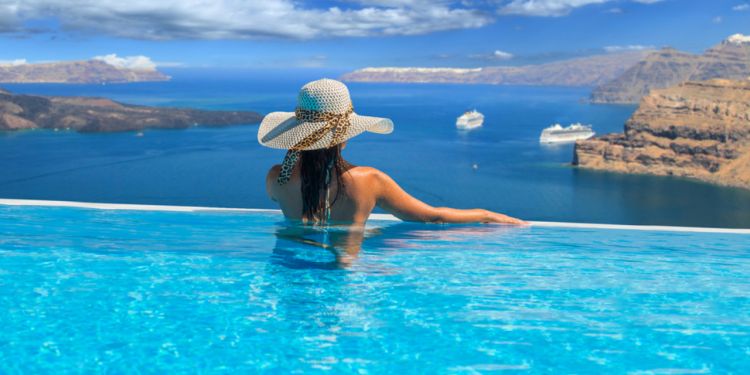Things to do in Greece

Greece has a rich culture and gastronomy scene, along with drinking, as well as plenty of things to see and learn, but also activities for those who seek a thrill or want to breathe in that mountain air. Even today, Greece still reels from the economic crisis but is slowly on the mend; luckily, with Tourism and its services being ever-present, this has been something to help drive Greece's economic recovery. They also do it so well. Greeks are hospitable, and there is so much to discover in terms of leisure, with rugged and unspoiled mountain regions, mouth-watering food and drinks, and exciting places to visit or simply relax at. We'll explore the state of leisure in Greece in this article.
Discovering Greek culture
To say that Greece is a living, breathing museum would be an understatement. It's not just the fact that there are 265 (and rising) museums scattered across the country: it's that the country itself is built on layers upon layers of history. Greece has been inhabited since the Paleolithic age, which gives some historical significance to every little rock you come across. There are pieces of ancient marble everywhere (not always as well protected as they should have been), cyclopean walls in the middle of fields, and caves that have been used as sanctuaries for eons. No matter where in Greece you find yourself, it's worth doing some research about the local area and going on a 'scavenger' hunt.
Not all of the museums are housed in impressive buildings, but every single one of them has something that will pique your interest. There are archaeological museums (Greece has more than 100 of those), Byzantine museums, historical and folk art museums that celebrate endless culture, and thematic museums that will show you the secrets of long-forgotten trades or crafts or even give you a glimpse of the future.
Of course, if you are in Athens, a must-see is the Acropolis. A visit to Greece's most celebrated landmark is well worth it for the incredible vantage point it has over Athens. Greece has many great temples, including the Parthenon, the Temple of Poseidon (at Sounion), and the Temple of Apollo at Delphi; all are amazing ancient sites to marvel at.
Another must-see in Greece is the Ancient City of Olympia, the birthplace of the Olympic Games. Located in the Elis region, the site has breathtaking structures such as the vast temple of Zeus and the original Olympic stadium used for Athletic events from 776 BC. Alternatively, if you are considering what the islands have to offer culturally, there are even more things to see. In Heraklion in Crete, you can visit and take a tour of the Palace of Knossos, the backdrop behind the myth of Theseus and the Minotaur. The palace is one of the best examples of ancient Minoan architecture, which was unearthed by a team of German and Austrian Archaeologists.
If you want to experience some Ancient Greek theatre, then look no further than Epidaurus. Theatre is still integral to Greeks, and at Epidaurus, you can view it in its earliest form, as the ancient Greeks would have seen it in an Outdoor Theatre.
Greeks like going to the movies, and you will find cinemas dotted in and around big cities, with independent Art cinemas found in Exarcheia in Athens, the ideal venue to watch independent or classic films, ranging to chain multiplex cinemas like the Odeon.
The theatres that will never go out of fashion in Greece are the open-air ones: although the movie quality is understandably not that great, it's the overall ambiance and the fact that they're intrinsically linked with the Greek summer that makes people choose them every time. There are Film Festivals that occur a couple of times a year, with some taking place on the islands.
Nature in Greece
Greece has such a diverse landscape that nature enthusiasts won't know where to begin. There are ragged mountains and steep gorges and cliffs where you can do mountain biking, trekking, or climbing. There are also forests and lakes where you can study the diverse marine and avian species — more than 442 species of birds can be found in Greece. And then, of course, there are the islands, with beaches that stretch for miles and invite you to swim water-ski or surf, and the deep blue seas with the mysterious underwater caves and ruins that urge you to put on your diving suit. The Mediterranean climate makes it easy to go exploring throughout the year, and a simple search online will find many professional groups that can provide the appropriate gear and guide you through your adventure.
As mentioned, Greece has a variety of nature depending on the regions, from the rocky outcrops and mountains of the Peloponnese to the flat plains of Thessaly. These little differences make hiking in Greece because you have so many choices. The Samaria Gorge is the longest in Europe and is located in Crete; hiking the gorge, you can take in some stunning views and experience an enjoyable yet challenging trail. The same can be said for venturing to the Vikos Gorge. Despite the busy nature of the island, Santorini is well worth a visit — even if it is just for the beaches. On the island, you are spoilt for choice with several picturesque beaches, like the iconic Red Beach, where you can relax and sunbathe and swim in the beautiful blue waters. Scuba diving is a great adventure, and although it is known as more of a party island. Mykonos offers some great spots for scuba diving and interesting wrecks in crystal clear water. The Anna II is a cargo ship that sank along the Southeast coast of Mykonos, the wreck is 60ms long, so there is plenty to explore. You will also see lots of marine life in the nearby reef.
Foods and drinks in Greece
Greece and food are intrinsically linked. For foodies, Greece is a paradise. In recent years, Thessaloniki has come to be considered Greece's gastronomical hub – with its variety of culinary influences and traditions a reflection of the historical and cultural past. Thessaloniki has an enticing street-food scene that rivals Athens, and offers tasty Souvlaki (as it is known in the Macedonian region), gyros and great takeaway sweets such as bougatsa.
With the city and the iconic White Tower's proximity to the coast, there is excellent seafood on offer and tavernas that serve traditional Greek and Macedonian regional cuisine.
Athens has a vibrant food culture, and you can find great spots in Plaka, Monastiraki, Kypseli and Exarcheia to enjoy some tasty meals. Some small plates, known as Meze, are perfect for sharing in a group, such as with family and friends, along with classic dishes like kolokithia (fried courgette fritters), Keftedakia (meatballs), feta meli (feta baked in honey and pastry), along with dips such as tzatziki and fava.
Fine drinking is also on the rise in Greece. Dozens of talented mixologists stir up innovative concoctions and do well at global cocktail competitions — Athens used to be the hub of this activity, but nowadays, most islands have a cocktail bar or two that is raising the bar. Alcohol is still very cheap to consume and buy in Greece, so people often go out socially for drinks, even in winter. There are plenty of bars in Greece where you can enjoy a drink, especially around Athens in its many squares, relax and have a drink taking while taking in the scenery of the city. Traditional Greek spirits like Tsipouro and Ouzo are ideal with seafood. Greece also has emerging brewery culture with many independent breweries setting up in the south, so it is worth asking in bars if they serve any locally produced beer. In Athens, the popular beers are mainly larger and include Alfa, Fix, Vergina and Mamos.
Aside from alcohol, coffee culture still reigns supreme in Greece. Walking around Greece in any region or city, you will come across countless chain and independent coffee shops and bars — many of them frequented by the locals and their friends, as coffee meetups are seen as weekly rituals to catch up with friends and hear their news. Popular coffees are the elliniko coffee (an expresso shot of coffee in a small cup), Frappe coffee (coffee with milk), and Freddo Expresso/cappuccino (iced coffee).
Going out in Greece
Since the crisis, things have improved in terms of shopping in Athens. Although there are still remnants of the past in the form of derelict shops, the crisis, in some ways, has helped bring down prices, so it can be quite affordable to pick up bargains in Greece's many markets as well as on the high street.
Ermou Street in Monastiraki is the high street for shopping in Athens. You will find big-name brands such as H&M, among others, and plenty of great lunch and coffee spots to chill at when you need a break from shopping. If you are looking for something a little different or souvenirs to bring back home, both Monastiraki and Piraeus Flea Markets are sure bets. The two are the top flea markets in the Attica area, and you will be sure to find interesting handmade crafts, antiques and souvenirs.
The nightlife and partying scene is still very strong in Mykonos and some of the other islands, and, of course, in the capital Athens and the other cities such as Thessaloniki and Patras. Clubbing initially faced a decline due to the crisis, but this has slowly recovered. There are many clubs and bar clubs throughout Athens, especially in the Athens' clubbing district known as Gazi/Keramikos. You can find many types of music from techno, Rnb, to pop to dance the night away to. Greece also has its type of clubs that play only Greek traditional and Greek Pop music known as Bouzoukia, which are worth a visit if you want a true taste of authentic Greek nightlife. In winter and spring, people tend to go out for drinks and to go to clubs in the center. With the arrival of summer, the beach bars and clubs open, and people head to the south coast of Athens, in areas such as Piraeus, Alimos and Glyfada, to party in the sun.









